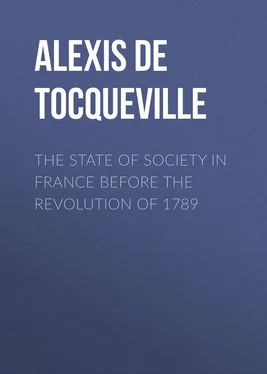Alexis de Tocqueville - The State of Society in France Before the Revolution of 1789
Здесь есть возможность читать онлайн «Alexis de Tocqueville - The State of Society in France Before the Revolution of 1789» — ознакомительный отрывок электронной книги совершенно бесплатно, а после прочтения отрывка купить полную версию. В некоторых случаях можно слушать аудио, скачать через торрент в формате fb2 и присутствует краткое содержание. Жанр: foreign_prose, История, foreign_edu, foreign_antique, на английском языке. Описание произведения, (предисловие) а так же отзывы посетителей доступны на портале библиотеки ЛибКат.
- Название:The State of Society in France Before the Revolution of 1789
- Автор:
- Жанр:
- Год:неизвестен
- ISBN:нет данных
- Рейтинг книги:3 / 5. Голосов: 1
-
Избранное:Добавить в избранное
- Отзывы:
-
Ваша оценка:
- 60
- 1
- 2
- 3
- 4
- 5
The State of Society in France Before the Revolution of 1789: краткое содержание, описание и аннотация
Предлагаем к чтению аннотацию, описание, краткое содержание или предисловие (зависит от того, что написал сам автор книги «The State of Society in France Before the Revolution of 1789»). Если вы не нашли необходимую информацию о книге — напишите в комментариях, мы постараемся отыскать её.
The State of Society in France Before the Revolution of 1789 — читать онлайн ознакомительный отрывок
Ниже представлен текст книги, разбитый по страницам. Система сохранения места последней прочитанной страницы, позволяет с удобством читать онлайн бесплатно книгу «The State of Society in France Before the Revolution of 1789», без необходимости каждый раз заново искать на чём Вы остановились. Поставьте закладку, и сможете в любой момент перейти на страницу, на которой закончили чтение.
Интервал:
Закладка:
Nothing was more astonishing than the extraordinary ease with which the Constituent Assembly destroyed at a single stroke all the ancient French provinces, many of which were older than the monarchy, and then divided the kingdom methodically into eighty-three distinct portions, as though it had been the virgin soil of the New World. Europe was surprised and alarmed by a spectacle for which it was so little prepared. ‘This is the first time,’ said Burke, ‘that we have seen men tear their native land in pieces in so barbarous a manner.’ No doubt it appeared like tearing in pieces living bodies, but, in fact, the provinces that were thus dismembered were only corpses.
While Paris was thus finally establishing its supremacy externally, a change took place within its own walls equally deserving the notice of history. After having been a city merely of exchange, of business, of consumption, and of pleasure, Paris had now become a manufacturing town; a second fact, which gave to the first a new and more formidable character.
The origin of this change was very remote; it appears that even during the Middle Ages Paris was already the most industrious as well as the largest city of the kingdom. This becomes more manifest as we approach modern times. In the same degree that the business of administration was brought to Paris, industrial affairs found their way thither. As Paris became more and more the arbiter of taste, the sole centre of power and of the arts, and the chief focus of national activity, the industrial life of the nation withdrew and concentrated itself there in the same proportion.
Although the statistical documents anterior to the Revolution are, for the most part, deserving of little confidence, I think it may safely be affirmed that, during the sixty years which preceded the French Revolution, the number of artisans in Paris was more than doubled; whereas during the same period the general population of the city scarcely increased one third.
Independently of the general causes which I have stated, there were other very peculiar causes which attracted working men to Paris from all parts of France, and agglomerated them by degrees in particular quarters of the town, which they ended by occupying almost exclusively. The restrictions imposed upon manufactures by the fiscal legislation of the time were lighter at Paris than anywhere else in France; it was nowhere so easy to escape from the tyranny of the guilds. Certain faubourgs, such as the Faubourg St. Antoine, and of the Temple specially, enjoyed great privileges of this nature. Louis XVI. considerably enlarged these immunities of the Faubourg St. Antoine, and did his best to gather together an immense working population in that spot, ‘being desirous,’ said that unfortunate monarch, in one of his edicts, ‘to bestow upon the artisans of the Faubourg St. Antoine a further mark of our protection, and to relieve them from the restrictions which are injurious to their interests as well as to the freedom of trade.’
The number of workshops, manufactories, and foundries had increased so greatly in Paris, towards the approach of the Revolution, that the Government at length became alarmed at it. The sight of this progress inspired it with many imaginary terrors. Amongst other things, we find an Order in Council, in 1782, stating that ‘the King, apprehending that the rapid increase of manufactures would cause a consumption of wood likely to become prejudicial to the supply of the city, prohibits for the future the creation of any establishment of this nature within a circuit of fifteen leagues round Paris.’ The real danger likely to arise from such an agglomeration gave no uneasiness to any one.
Thus then Paris had become the mistress of France, and the popular army which was destined to make itself master of Paris was already assembling.
It is pretty generally admitted, I believe, now, that administrative centralisation and the omnipotence of Paris have had a great share in the overthrow of all the various governments which have succeeded one another during the last forty years. It will not be difficult to show that the same state of things contributed largely to the sudden and violent ruin of the old monarchy, and must be numbered among the principal causes of that first Revolution which has produced all the succeeding ones.
CHAPTER VIII
If we carefully examine the state of society in France before the Revolution we may see it under two very contrary aspects. It would seem that the men of that time, especially those belonging to the middle and upper ranks of society, who alone were at all conspicuous, were all exactly alike. Nevertheless we find that this monotonous crowd was divided into many different parts by a prodigious number of small barriers, and that each of these small divisions formed a distinct society, exclusively occupied with its own peculiar interests, and taking no share in the life of the community at large.
When we consider this almost infinitesimal division, we shall perceive that the citizens of no other nation were so ill prepared to act in common, or to afford each other a mutual support during a crisis; and that a society thus constituted might be utterly demolished in a moment by a great revolution. Imagine all those small barriers thrown down by an earthquake, and the result is at once a social body more compact and more homogeneous than any perhaps that the world had ever seen.
I have shown that throughout nearly the whole kingdom the independent life of the provinces had long been extinct; this had powerfully contributed to render all Frenchmen very much alike. Through the diversities which still subsisted the unity of the nation might already be discerned; uniformity of legislation brought it to light. As the eighteenth century advanced there was a great increase in the number of edicts, royal declarations, and Orders in Council, applying the same regulations in the same manner in every part of the empire. It was not the governing body alone but the mass of those governed, who conceived the idea of a legislation so general and so uniform, the same everywhere and for all: this idea was apparent in all the plans of reform which succeeded each other for thirty years before the outbreak of the Revolution. Two centuries earlier the very materials for such conceptions, if we may use such a phrase, would have been wanting.
Not only did the provinces become more and more alike, but in each province men of various classes, those at least who were placed above the common people, grew to resemble each other more and more, in spite of differences of rank. Nothing displays this more clearly than the perusal of the instructions to the several Orders of the States-General of 1789. The interests of those who drew them up were widely different, but in all else they were identical. In the proceedings of the earlier States-General the state of things was totally different; the middle classes and the nobility had then more common interests, more business in common; they displayed far less reciprocal animosity; yet they appeared to belong to two distinct races. Time, which had perpetuated, and, in many respects, aggravated the privileges interposed between two classes of men, had powerfully contributed to render them alike in all other respects. For several centuries the French nobility had grown gradually poorer and poorer. ‘Spite of its privileges the nobility is ruined and wasted day by day, and the middle classes get possession of the large fortunes,’ wrote a nobleman in a melancholy strain in 1755. Yet the laws by which the estates of the nobility were protected still remained the same, nothing appeared to be changed in their economical condition. Nevertheless, the more they lost their power the poorer they everywhere became, in exactly the same proportion.
Читать дальшеИнтервал:
Закладка:
Похожие книги на «The State of Society in France Before the Revolution of 1789»
Представляем Вашему вниманию похожие книги на «The State of Society in France Before the Revolution of 1789» списком для выбора. Мы отобрали схожую по названию и смыслу литературу в надежде предоставить читателям больше вариантов отыскать новые, интересные, ещё непрочитанные произведения.
Обсуждение, отзывы о книге «The State of Society in France Before the Revolution of 1789» и просто собственные мнения читателей. Оставьте ваши комментарии, напишите, что Вы думаете о произведении, его смысле или главных героях. Укажите что конкретно понравилось, а что нет, и почему Вы так считаете.












